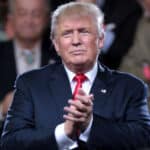


In a pivotal moment for academic freedom and community safety, Columbia University has found itself at the heart of controversy. Columbia University professor Shai Davidai, known for his support of Israel, was banned from campus following anti-Israel student protests, amid growing calls for President Minouche Shafik's resignation and rising concerns over antisemitism.
The New York Post reported that Davidai, an assistant professor at Columbia Business School and a staunch supporter of Israel, faced backlash for his critical view of the university's handling of anti-Israel protests.
As tensions on campus escalated, Davidai attempted to lead a pro-Jewish rally but was consequently barred from entering university grounds, with his university ID deactivated.
The barring of Davidai coincided with the emergence of a new tent city of approximately 200 protesters on campus. Despite the significant size and impact of this protest camp, university administrators chose not to intervene, highlighting a stark contrast to their handling of previous protests.
The atmosphere on campus grew increasingly hostile as protesters made pro-Hamas and antisemitic statements, including threats directed at pro-Israel demonstrators. This hostile environment led to a Jewish Columbia student filing an NYPD hate crime report after being attacked by pro-Palestinian protesters.
Amid the growing tensions, many supporters of the Jewish community, who attempted to enter the campus for peace rallies or support, found themselves denied access. However, some with active Columbia University IDs were allowed through, adding to the confusion and frustration among the pro-Jewish community.
The outcry over the university's actions has attracted significant attention from politicians and public figures. Calls for Columbia University President Minouche Shafik's resignation have intensified, led by figures such as House Republican Conference Chair Elise Stefanik and other prominent New York Republicans.
New York Governor Kathy Hochul has also stepped into the fray, criticizing the university's handling of the situation and underscoring the importance of student safety in these turbulent times. Pro-Israel protesters, outside Columbia's gates, echoed this sentiment, demanding Davidai be allowed back on campus and condemning the university's actions.
The irony of the situation was not lost on Davidai who noted the peculiarity of having access to the business school's campus but not the main university campus. He urged supporters of Israel to document any instances of discriminatory denial of entry to the campus, highlighting the systemic issues at play.
In response to the exclusion of Davidai, Rep. Jared Moskowitz drew parallels between the university's actions and Nazi policies, criticizing the barring of Jews from campus spaces. Similarly, Reps. Dan Goldman and Josh Gottheimer emphasized the urgent need for action against antisemitism and called for university accountability.
In the lead-up to Passover, the university canceled in-person classes as a precaution against the escalating protests. NYPD officials, recognizing their limited jurisdiction on campus, nevertheless assured the public that they would respond to any violent incidents.
New York City Mayor Eric Adams condemned the antisemitic undertones of the protests, assuring that investigations into the incidents were underway. Amid growing fears of anti-Jewish sentiment, President Shafik pledged to address security concerns and combat antisemitism, aiming to restore the sense of community and safety on campus.
As the situation unfolds, the Columbia University community awaits concrete actions to address the issues of safety, discrimination, and freedom of speech. With the university under scrutiny, the world watches how it navigates the complex terrain of academic freedom and community safety.
The exclusion of Professor Shai Davidai from Columbia University amidst anti-Israel protests has ignited a broader discussion on antisemitism, academic freedom, and campus safety. The emergence of a protest camp and the administration's differing responses have intensified scrutiny on university policies. Political figures and public officials have voiced their concerns, calling for accountability and actions to safeguard the community. As calls for President Minouche Shafik's resignation grow louder, the university faces a critical moment to address these challenges and reaffirm its commitment to an inclusive and safe academic environment. With the community's bonds "severely tested," as President Shafik noted, the path to reconciliation and understanding seems fraught yet imperative for the university's future.



